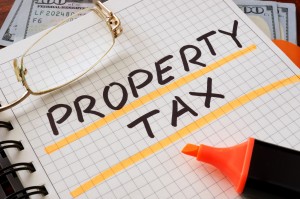More detail on the legislative deal to address school finance, property taxes, and TRS

School Finance School Safety Testing | Accountability
Date Posted: 5/24/2019 | Author: Mark Wiggins
 As the ATPE lobby team reported here on our blog yesterday, Texas Gov. Greg Abbott, Lt. Gov. Dan Patrick, and House Speaker Dennis Bonnen, collectively known as the "Big Three" heads of government, held a press conference Thursday afternoon to announce that negotiators had finalized a grand bargain to address property tax relief, school finance reform, and funding for the Teacher Retirement System (TRS). Gov. Abbott told media that lawmakers had reached agreement on the budget, House Bill (HB) 1; the property tax relief bill, Senate Bill (SB) 2; HB 3, which deals with a combination of property taxes and school finance; and SB 12 addressing TRS funding. Each of the three leaders took turns explaining parts of the final compromise.
As the ATPE lobby team reported here on our blog yesterday, Texas Gov. Greg Abbott, Lt. Gov. Dan Patrick, and House Speaker Dennis Bonnen, collectively known as the "Big Three" heads of government, held a press conference Thursday afternoon to announce that negotiators had finalized a grand bargain to address property tax relief, school finance reform, and funding for the Teacher Retirement System (TRS). Gov. Abbott told media that lawmakers had reached agreement on the budget, House Bill (HB) 1; the property tax relief bill, Senate Bill (SB) 2; HB 3, which deals with a combination of property taxes and school finance; and SB 12 addressing TRS funding. Each of the three leaders took turns explaining parts of the final compromise.
The only details available yesterday were in the form of a handout given to members of the media and the comments made by the elected officials. As of Thursday afternoon, most legislators had not even seen the actual text of the final plan. Even though the bills have not yet been made available to the public as of 5:30 this Friday afternoon, ATPE's lobbyists have had their first "unofficial" look today at the new bill language proposed for HB 3 and can provide some additional insights and observations.
 SCHOOL FINANCE
SCHOOL FINANCE
The price tag of the newest version of the school finance legislation has expanded to more than $11 billion. According to the handout shared with reporters yesterday, the compromise plan includes $4.5 billion intended to:
- Increase the basic allotment from $5,140 to $6,160 per student.
- Fund full-day pre-K for low-income students
- Adopt high-quality reading standards for grades K-3
- Create a dyslexia identification program
- Support dual-language programs and extended year summer programs for economically disadvantaged students
- Provide outcomes-based bonuses for college, career, and military readiness (CCMR)
- Fund transportation at a rate of $1.00 per mile, as opposed to on a per-student basis
- Quadruple funding for building and equipping new facilities
- Direct more funds to schools with higher concentrations of under-served students, including dropouts, students in special education, and students in residential treatment facilities
Here are some additional details gleaned from the previewed language of the final bill:
Outcomes-based funding:
- Controversial outcomes-based funding tied to third-grade reading performance was removed from the final bill.
- The bill includes outcomes-based bonuses for college, career, and military readiness that are tied to the number of graduates who exceed a minimum threshold to be determined by the commissioner.
- The bonuses paid to the school district would be weighted based whether or not the graduating students are educationally disadvantaged (either $3,000 or $5,000 per student above the minimum number of students established by the commissioner for each group).
- The bill also defines the readiness standard for each category of college, career, or military, with commissioner authority for setting some criteria.
- School districts will be required to spend at least 55 percent of the bonuses they receive in grades 8 through 12 to improve readiness outcomes.
- The bill calls for TEA to conduct a study on alternative career readiness measures for small and rural school districts with results to be reported to the legislature by January 1, 2021.
Bilingual education funding:
- In addition to other uses already outlined in current law, districts will be allowed to use funding associated with bilingual education for "incremental costs associated with providing smaller class sizes."
- Districts must now use at least 55 percent of the bilingual allotment to provide bilingual education or special language program, and the bill authorizes the commissioner to reduce a district's FSP amount in subsequent years by an amount equal to the amount of bilingual education or special language funds the commissioner determines were not used in in this manner.
Career and technology:
- The Career and Technology Allotment is expanded to cover students in grades 7 through 12, rather than just high school students.
- The bill adds funding for students enrolled in a campus designated as a P-TECH school or a campus that is a member of the New Tech Network and focuses on project-based learning and work-based education.
- For purposes of the allotment, the definition of "career and technology education class" is broadened to include technology applications courses generally (rather than being restricted to approved cybersecurity courses).
- Similar to the bilingual allotment, districts must use at least 55 percent of the career and technology allotment for providing CTE programs in grades 7 through 12.
- Districts will be entitled to reimbursement if they pay a subsidy for a student in a special education or career and technology program to earn a license or certificate, as allowed under current law.
Early education:
- The bill adds an early education allotment for students in grades K-3 where funding is increased for educationally disadvantaged students and students of limited English proficiency who are enrolled in a bilingual or special language program. The funds must be used to improve student performance in reading and math in Pre-K through through third grade.
- While not tied specifically or directly to funding, HB 3 calls for school boards to adopt five-year plans for early childhood literacy and mathematics proficiency that include annual goals for student performance. The plans should include goals for aggregate student growth on certain assessment instruments and targeted professional development for teachers in these early grades.
Miscellaneous:
- HB 3 calls for using current year property values to determine school districts' available tax revenue, as opposed to the prior year's values under current law. This change has been highly controversial, with several districts complaining that they will lose money with this change.
- School districts or charter schools that offer an additional 30 days of half-day instruction for students in grades pre-K through 5 will be entitled to additional incentive funding.
- The bill's new Fast Growth Allotment applies to school districts in which enrollment for the past three school years is in the top quartile of student enrollment growth for the entire state. These districts will be entitled to additional funding equating to the basic allotment multiplied by 0.04 for each student in average daily attendance.
- Districts will be entitled to reimbursement of fees they pay under existing law for the administration of college-prep assessments to high school juniors and seniors.
- The bill calls for TEA to partner with a public institution of higher education to study and report to the legislature on geographic variations in the cost of education and transportation costs. Results of the study must be reported by Dec. 1, 2020.
TEACHER PAY & BENEFITS
 The plan announced yesterday aims to spend $1.6 billion over the next two years to provide what state leaders have described as "dynamic pay raises" for teachers, librarians, counselors, and nurses, while prioritizing veteran educators. They also indicated in yesterday's press statements that the state would contribute $922 per teacher over the next two years to the Teacher Retirement System (TRS) of Texas in order to make it actuarially sound. The plan includes $140 million for a merit/incentive pay program, $30 million annually for an extended year program that rewards teachers who work an additional 30 days during the summer, $8 million for mentoring new teachers, and $6 million toward professional development for teachers in blended learning instruction. Here are some additional details based upon ATPE's reading of the bill.
The plan announced yesterday aims to spend $1.6 billion over the next two years to provide what state leaders have described as "dynamic pay raises" for teachers, librarians, counselors, and nurses, while prioritizing veteran educators. They also indicated in yesterday's press statements that the state would contribute $922 per teacher over the next two years to the Teacher Retirement System (TRS) of Texas in order to make it actuarially sound. The plan includes $140 million for a merit/incentive pay program, $30 million annually for an extended year program that rewards teachers who work an additional 30 days during the summer, $8 million for mentoring new teachers, and $6 million toward professional development for teachers in blended learning instruction. Here are some additional details based upon ATPE's reading of the bill.
Educator compensation:
The increase in the basic allotment will also cause an increase in the state’s minimum salary schedule that applies to teachers and some other educators. This will have the effect of increasing the floor for many educators, providing raises for some, and increasing the state’s share of TRS pension contributions while lowering the district’s share.
According to ATPE Lobbyist Andrea Chevalier, HB 3 also includes a mechanism to automatically require districts to increase some educators' pay under certain circumstances. Here are some more details:
- If the basic allotment of a district increases from one year to the next, the district must use at least 30% of the difference in the funding level to provide pay increases to certain full-time school employees who are not administrators. (For instance, if a district had an increase in student funding from one year to the next of $100,000, the district would need to spend at least $30,000 on increased compensation.)
- Of this “at least 30%” amount, 75% of that funding must be used for compensation increases for full-time classroom teachers, counselors, librarians, and school nurses. However, districts must prioritize using this money for increasing the compensation for classroom teachers with more than five years of experience.
- The other 25% of the "at least 30% amount" may be used as determined by the district to increase compensation for full-time district employees.
- Unlike the earlier versions of HB 3, there is no requirement that these compensation increases be made in an across-the-board manner with each eligible employee receiving the same amount. There is also no guarantee that all of the employees in these categories would receive a salary increase under this bill.
- It is unclear but presumed that the compensation increases allowed under this section of the bill would be in addition to potential stipends provided by districts' participation in extended school year, mentoring, or merit pay programs that are also in HB 3.
ATPE Governmental Relations Director Jennifer Mitchell provided additional insights on the bill's merit pay language. The new "Teacher Incentive Allotment" is structured in a manner similar to the Senate's adopted proposal for merit pay, but the final HB 3 proposal will give districts more flexibility, reduce the commissioner's authority to set criteria compared to what was in the Senate plan, and place less emphasis on student performance and test scores compared to the Senate plan. While the allotment does provide districts with new funding that is specifically allocated for teacher compensation, there are few guarantees that the teachers who demonstrate the merit as defined by this bill will receive substantially higher pay. Still, we are pleased that legislators listened to our requests that they remove troubling test-based criteria from the merit pay plan.
- School districts would be eligible for additional funding through this allotment for certain teachers who are designated as recognized, exemplary, or master teachers. It is important to emphasize that these funds do not flow directly to the teachers who earn the designations but are paid to the districts instead.
- The designations are defined in a new statute under which a school district or open-enrollment charter school has the local option of designating a certified classroom teacher as a master, exemplary, or recognized teacher for a five-year period. Designations would be noted on the teacher's virtual certificate maintained by SBEC. Teachers will have no vested property right in the designation according to this bill, and any designation found to have been made improperly will be voided. HB 3 repeals various older "master teacher" statutes that are being replaced with this program.
- Districts are not required to participate in this new local optional teacher designation program, but we assume that most will want to participate in order to qualify for the additional state funding that is tied to it.
- The bill requires the commissioner to set "performance and validity standards" that will mathematically allow for all eligible teachers to earn the designation. The bill adds that these standards "may not require a district" to use a state assessment instrument like the STAAR test "to evaluate teacher performance."
- Districts may designate a nationally board-certified teacher as recognized even if the teacher does not otherwise meet the performance standards set by the commissioner.
- The teacher designations will be based on the results of single year or multiyear appraisals of the teachers pursuant to the existing T-TESS statutes. Unlike the Senate's merit pay proposal that called for a competitive statewide ranking of teachers based on student performance, districts will determine eligibility for the new merit designations using evaluation criteria, which under the existing T-TESS statutes incorporate observations of teacher performance and the performance of teachers' students. These determinations will be subject to the performance standards set by the commissioner, however, and the local designation system must be validated.
- For the validation element, Texas Tech University is tasked with monitoring the quality and fairness of the local optional teacher designation systems. The commissioner is required to ensure that the local optional teacher designation systems "prioritize high needs campuses." TEA will be required, with cooperation from the participating districts, to evaluate the effectiveness of the local optional teacher designation systems and report their findings to the legislature.
- The commissioner may adopt fees and rules to implement this program.
- The amount of the funding paid to districts through this allotment will vary. Districts may receive between $3,000 and $9,000 for each recognized teacher; between $6,000 and $18,000 for each exemplary teacher; and between $12,000 and $32,000 for each master teacher. We presume that specific amounts paid within these ranges will be determined by the commissioner and outlined more specifically in commissioner's rules to be adopted later.
- If the recognized, exemplary, or master teacher works at a rural campus or one that serves a higher number of disadvantaged students, a funding weight is applied to the allotment that entitles the district to higher funding.
- Districts must certify annually that they are spending the allotment in compliance with the law. They are required to show that they have "prioritized high needs campuses" in their use of the allotment.
- The districts will be required to spend at least 90 percent of the allotment "for the compensation of teachers" who are employed at the same campus as the campus where the teacher who earned the designation and enabled the district to receive the additional funding is employed. Note that this does not specifically require the teacher who earned the designation corresponding to the allotment to receive any additional funding. In other words, districts will have discretion on how they spend these funds for teacher compensation.
- Beyond the 90 percent requirement, districts may use the allotment for costs associated with implementing the teacher designation program.
- Unfortunately, there is no language in the bill ensuring that this allotment cannot be used by school districts to supplant other district funds for teacher compensation.
TAX RELIEF
 The proposal includes $5 billion for tax relief that is intended increase the state's share of education funding to 45 percent from 38 percent. The governor's office claims the plan will lower school property tax rates by an average of eight cents per $100 of property valuation in 2020 and 13 cents in 2021, and provide an additional 2.5 percent tax compression starting in 2021. The plan also requires efficiency audits before holding a tax election.
The proposal includes $5 billion for tax relief that is intended increase the state's share of education funding to 45 percent from 38 percent. The governor's office claims the plan will lower school property tax rates by an average of eight cents per $100 of property valuation in 2020 and 13 cents in 2021, and provide an additional 2.5 percent tax compression starting in 2021. The plan also requires efficiency audits before holding a tax election.
RECAPTURE
Part of the plan addresses recapture, often commonly referred to as a "Robin Hood" system, which seeks to ensure equity by transferring tax revenue from property-wealthy districts to those that are property-poor. The promotional materials indicated that recapture would be reduced by $3.6 billion as part of the $11.6 billion investment made in HB 3 to buy down property taxes and reform school finance formulas.
OTHER PROVISIONS
The negotiated version of HB 3 contains a number of provisions that bear little relation to "school finance." For instance, the bill requires the State Board for Educator Certification (SBEC) to adopt rules that that will pertain to new certificates issued after Jan. 1, 2021 and will require teachers to demonstrate proficiency in the science of teaching reading before they can be assigned to teach any grade level from prekindergarten through grade six.
 The bill also adds new reading standards for kindergarten through third grade students. Under these standards, school districts and open-enrollment charter schools must use a phonics curriculum that uses systematic direct instruction to ensure all students obtain necessary early literacy skills. Districts must also ensure that teachers of grades K-3 and principals at the campuses serving those grades have attended a literacy achievement academy by no later than the 2021-2022 school year. Additionally, the district or charter school must certified that it has prioritized placement of "highly effective" teachers in classrooms for grades K-2. The commissioner will adopt rules to implement these new provisions.
The bill also adds new reading standards for kindergarten through third grade students. Under these standards, school districts and open-enrollment charter schools must use a phonics curriculum that uses systematic direct instruction to ensure all students obtain necessary early literacy skills. Districts must also ensure that teachers of grades K-3 and principals at the campuses serving those grades have attended a literacy achievement academy by no later than the 2021-2022 school year. Additionally, the district or charter school must certified that it has prioritized placement of "highly effective" teachers in classrooms for grades K-2. The commissioner will adopt rules to implement these new provisions.
Other non-finance related provisions of the bill include measures related to educator misconduct and eligibility to work in a public school.
- The bill will create a "do not hire" registry of educators who are ineligible for employment. HB 3 adds requirements for reporting alleged misconduct to TEA and SBEC. To facilitate such reporting, SBEC will be required to set up a new internet portal that superintendents will use to share such information.
- The bill gives the commissioner of education authority to investigate and sanction non-certified employees in a manner similar to SBEC's current disciplinary authority over certified educators.
- The commissioner will also have broad access to school district records, the criminal history record clearinghouse, and law enforcement records from criminal cases to ensure compliance with the requirement to report allegations of misconduct.
- For Districts of Innovation (DOI), failure to comply with the reporting requirements can invalidate their designation as a DOI.
ATPE's Governmental Relations staff members are continuing to analyze the newly designed versions of these bills and will provide additional details throughout these final days of the session. We expect the House and Senate to vote on them either Saturday or Sunday, and we hope that the new bill text for HB 3 and SB 12 will be shared with the public this evening. Be sure to follow @TeachtheVote on Twitter for the latest rapidly developing updates.
CONVERSATION
RECOMMENDED FOR YOU

07/03/2025
Teach the Vote’s Week in Review: July 3, 2025
A federal funding freeze threatens Texas schools and summer learning, and the U.S. House approves Trump’s “big, beautiful bill.”

07/03/2025
Federal education funding freeze threatens Texas schools and summer learning
The Trump Administration’s sudden move to withhold nearly $7 billion in education funding owed to states came with no explanation. ATPE asks Congress to intervene.

06/30/2025
Recap of the June 2025 SBOE Meeting
The Texas State Board of Education (SBOE) met June 24–27, 2025, in Austin.

